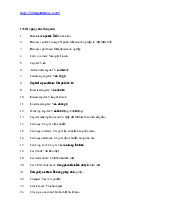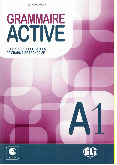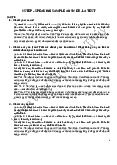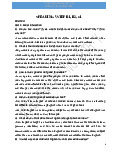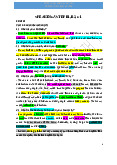













Preview text:
Bài tập Modal verb có đáp án
I. Lý thuyết cách làm Modal verb
1. Động từ khuyết thiếu – Modal verbs l à gì?
Động từ khuyết thiếu (Modal Verbs) là loại động từ có chức năng bổ trợ nghĩa
cho động từ chính, không được sử dụng là động từ chính trong câu. Nó dùng
để diễn đạt khả năng, sự dự định, sự cấm đoán hay cả sự cần thiết… Động từ
khuyết thiếu đứng trước động từ chính ở dạng nguyên thể để bổ sung nghĩa cho động từ chính.
Một số động từ khuyết thiếu phổ biến như: have to, must, can, could, may,
might, should, ought to,… Cấu trúc:
(+) S + Modal verb (must/can/could/may/might/should,…) + V (nguyên thể) + O
(-) S + Modal verb (must/can/could/may/might/should,…) + not + V (nguyên thể) + O
(?) Modal verb (must/can/could/may/might/should,…) + S + V (nguyên thể) + O? Ví dụ:
- Linda can play volleyball very well. (Linda có thể chơi bóng chuyền rất giỏi.)
- You should finish your homework before going to the theatre. (Bạn nên hoàn
thành bài tập về nhà của mình trước khi đi xem phim.)
- Can you please get out of here? (Bạn làm ơn có thể ra khỏi đây không?)
- She has a fever. Tomorrow she would not go to school (Cô ấy đã bị sốt, ngày
mai chắc cô ấy sẽ không đi học được)
2. Đặc điểm của động từ khuyết thiếu
Do không mang đầy đủ chức năng và tính chất của động từ thường, khi sử dụng
các động từ khuyết thiếu chúng ta cần lưu ý những điểm sau đây.
Không phải chia theo các ngôi s ố í
t hay số nhiều
Các động từ khuyết thiếu không phải chia theo các ngôi số ít hay số nhiều, chỉ sử
dụng ở hai thời điểm đó là hiện tại và quá khứ.
Dạng của hiện tại: may, should, can, will, ought to, had better
Dạng của quá khứ: might, should, could, would, ought to, had better Ví dụ:
- My brother can speak French fluently. (Anh trai của tôi có thể nói tiếng Pháp thành thạo.)
- We could go out if it didn’t rain. (Chúng tôi đã có thể ra ngoài đi chơi nếu mà trời không mưa.) Không c
ó dạng nguyên mẫu, không c
ó “to” hay các dạng phân từ khác.
Thay vì được sử dụng cho tất cả các thì như động từ thường, động từ khuyết thiếu
không có dạng nguyên mẫu, không có “to” hay bất kỳ dạng phân từ nào khác. Ví dụ:
- Linda can dance very beautifully. (Linda có thể nhảy rất đẹp.)
- Bill will go to Cat Ba tomorrow. (Bill sẽ đi Cát Bà vào ngày mai.)
Không cần trợ động từ đi kèm trong câu hỏi Yes/No hoặc câu hỏi có vấn từ. Ví dụ:
A: Can you swim? (Bạn có thể bơi không?)
B: Yes, I can (Tôi có thể.)
Có cách dùng tương đối như một trợ động từ trong câu.
Động từ khuyết thiếu đứng trước động từ chính và bổ nghĩa cho động từ đó, vì vậy
chúng mang cách dùng tương tự như một trợ động từ. Ví dụ:
- I will go to Sam Son beach next Sunday. (Tôi sẽ đi tới biển Sầm Sơn vào chủ nhật tới đây.)
- I won’t go to Sam Son beach next Sunday. (Tôi sẽ không đi tới biển Sầm Sơn vào chủ nhật tới đây.)
3. Các động từ khuyết thiếu thường gặp
Mỗi động từ khuyết thiếu sẽ có một ý nghĩa và chức năng riêng biệt. Vì vậy chúng
ta phải nắm rõ cách dùng của từng từ để có thể vận dụng linh hoạt trong ielts tiếng
Anh cũng như tránh những nhầm lẫn không đáng có. Hãy cùng Step Up tổng hợp
lại một số động từ khuyết thiếu thường gặp nhất qua bảng ngay sau nhé. Động từ khuyết Chức năng Ví dụ Chú ý thiếu • This class can Can và Could trong Diễn tả khả năng tại start in ielts tiếng Anh còn
hiện tại hoặc tương lai Can: có September
được sử dụng trong các
về ai đó có thể làm được thể •
Linda can sing câu hỏi, câu đề nghị, những gì hoặc một sự
and dance very xin phép và yêu cầu.
việc có thể sắp xảy ra. well My daughter could V í dụ: Could: có
thể (dạng Diễn đạt một khả năng read books when she • Could you quá
khứ xảy ra trong thì quá khứ was only four years repeat your của “can”) old. name, please?
Diễn tả sự cần thiết phải
làm điều gì nhưng là do “You have to Don’t have to = Don’t
Have to: tác động bởi yếu tố stop smoking.” Her need to (không cần phải
khách quan (nội quy, doctor said. thiết phải làm gì) quy định…) • Diễn đạt sự cần thiết, điều bắt
Mustn’t – chỉ sự một buộc ở thì hiện • All students must hand in cấm đoán tại hoặc trong their Must: tương lai assignments phải, chắc • Đưa ra lời before 18th hẳn khuyên hay sự Ví dụ: August. suy luận mang tính chắc chắn, • It’s raining. It • You mustn’t must be cold. yêu cầu được smoke here! nhấn mạnh May:
có Diễn tả điều gì có thể May và might còn có It may rain today thể xảy ra ở hiện tại thể dùng để xin phép. Nhưng might ít sử dụng trong văn nói, chủ
Might: có Diễn tả điều gì có thể yếu sử dụng trong câu
thể (dạng xảy ra ở quá khứ (cũng gián tiếp: Who has just called quá
khứ có thể dùng cho hiện tại nhưng ít khả Lam might be June. năng hơn của “may”) “may”) Ví dụ: • May I close the door?. • Diễn đạt về sự •
Tomorrow will Will và Would còn dự đoán sự việc be rainy.
được dùng trong câu đề xảy sẽ ra trong • Did you buy a nghị, yêu cầu và lời Will: sẽ tương lai. pen for me ? mời • Đưa ra một Oh, sorry. I’ll quyết định ngay go now. tại thời điểm nói. Ví dụ: ả ộ ả đị Would: diễn t m t gi nh xảy • Will you take a sẽ
(quá ra hoặc một dự đoán về I would go picnicking photo? khứ
của sự việc có thể xảy ra if it didn’t rain. • Would you like “will”) trong quá khứ a cup of tea? Thường dùng để xin ý kiến và lời
khuyên. (Hiện nay Where shall we eat Shall: sẽ “will” đượ
c sử dụng tomorrow evening? nhiều hơn so với “shall”) • Diễn đạt sự bắt • You should buộc hay nhiệm send this vụ bắt buộc contract to John nhưng ở mức độ before 5 p.m. nhẹ hơn so với • You should go Should: “must” to bed before 11 nên • Dùng để đưa ra p.m everyday. lời khuyên và ý • He studied very kiến hard, he should • Dùng để đưa ra get better suy đoán grades.
Chỉ sự bắt buộc, có tính Ought to: chất mạnh hơn You ought not to eat ice nên
“Should” nhưng bé hơn cream at night. “Must” II. Bài tập Modal verb
Exercise 1. Choose the best option for each sentence:
1) Young people ______ obey their parents. a. must b. may c. will d. ought to
2) Laura, you and the kids just have dinner without waiting for me. I ______ work very hard today. a. can b. may c. should d. would
3) I ______ be delighted to show you round the factory. a. ought to b. would c. might d. can
4) Leave early so that you ______ miss the bus. a. didn’t b. won’t c. shouldn’t d. mustn’t
5) Jenny's engagement ring is enormous! It ______ have cost a fortune a. must b. might c. will d. should
6) You ______ to write them today. a. should b. must c. had d. ought 7) I hope I ______ find it. a. will b. shall c. could d. must
8) Unless he runs he______ catch the train. a. will b. mustn’t c. wouldn’t d. won’t
9) ______ you be in Rome tonight. a. will b. may c. might d. maybe
10) We ______ have time to help you tomorrow. a. may b. must c. will d. could.
11) "______ you hand me that pair of scissors, please?" a. May b. Will c. Shall d. Should
12) Jeanette did very badly on the exam. She _____ harder. a. must have studied b. should have studied c. could have studied d. must studied
13) He was very lucky when he fell off the ladder. He _____ himself. a. could have hurt b. should have hurt c. must have hurt d. will have hurt
14) Marcela didn't come to class yesterday. She _____ an accident. a. should have had b. might have c. must have d. may have had
15) John still hasn't come out. He ______ everything for the trip now. a. must have been preparing b. will be preparing c. must be preparing d. will have prepared
16) Thomas received a warning for speeding. He _____ so fast. a. shouldn't have driven b. would have driven c. should have d. might have driven
17) The photos are black. The X-ray at the airport _____ them. a. should have damaged b. would have damaged c. would damage d. must have damaged
18) Tom didn't do his homework, so the teacher became very angry. He _____ his homework. a. must have done b. should have done c. might have d. will have done
19) My car stopped on the high way. It _____ out of gas a. may run b. may have run c. must be d. should have run
20) Robert arrived without his book. He _____ it. a. could have lost b. should have lost c. would have lost d. will have lost
21) "Where do you think Rooney is today?". "I have no idea. He _____ late." a. should have left b. would have sleep c. would sleep d. may have sleep
22) Berbatov painted his bedroom black. It looks dark and dreary. He _____ a different color. a. had to choose b. should have chosen c. must have chosen d. could have been choosing
23) The children _____ "thank you" to you when you gave them their gifts. a. will have said b. must say c. should have said d. should say
24) If we had known your new address, we _____ to see you. a. came b. would have come c. will come d. would come
25) These two boys look identical. They _____ twins. a. must have been b. must be c. should be d. should have been Đáp án:
Exercise 1. Choose the best option for each sentence:
1 - a; 2 - c; 3 - b; 4 - b; 5 - a;
6 - c; 7 - b; 8 - c; 9 - a; 10 - c;
11 - a; 12 - b; 13 - a; 14 - d; 15 - c;
16 - a; 17 - d; 18 - b; 19 - b; 20 - a;
21 - d; 22 - b; 23 - c; 24 - b; 25 - a;
Exercise 2. Rewrite the sentence i n the same meaning:
26) Perhaps Susan know the address. (may)
Susan ........................................................................................................
27) It's possible that Joanna didn't receive my message. (might)
Joanna ......................................................................................................
28) The report must be on my desk tomorrow. (has)
The report .................................................................................................
29) I managed to finish all my work. (able)
I ................................................................................................................
30) It was not necessary for Nancy to clean the flat. (didn't)
Nancy ......................................................................................................
31) The best thing for you to do is to sit down sit down. (better)
You .......................................................................................................... Đáp án:
Exercise 2. Rewrite the sentence i n the same meaning:
26. Susan may know the address
27. Joanna mightn't have received my message
28. The report has to be on my desk tomorrow
29. I was able to finish all my work
30. Nancy didn't need to clean the flat 31. You had better sit down
Exercise 3. Rewrite the sentence i n the same meaning:
32. I think you should give up smoking immediately. (had)
I think you ……………………………………………………
33. I am sure you were surprised when you heard all the news (must)
You ………………………………………………………………….. when you heard the news
34. It’s very inconvenient if you can’t drive. (able)
…………………………………………………………………
35. Someone almost certainly broke the window on purpose. (must)
The window ………………………………………………….. on purpose
36. I am sure that the cat is in the house somewhere. (must)
……………………………………………………………………
37. It is possible that one of the men died on the mountain. (may)One of the men
……………………………………………………on the mountain.
38. It’s necessary for me to bring my passport. (have)
I ……………………………………………………………………
39. It wasn’t necessary for you to do all this work (needn’t)
You ………………………………………………….. all this work
40. I am sure that John is not the thief. (can’t)
………………………………………………………………….. Đáp án:
Exercise 3. Rewrite the sentence i n the same meaning:
32. I think you had better give up smoking immediately.
33. You must have been surprised when you heard the news.
34. It is very inconvenient if you aren’t able to drive.
35. The window must have been broken on purpose.
36. I am sure that the cat must be in the house somewhere.
37. One of the men may have died on the mountain.
38. I have to bring my passport.
39. You needn’t have done all this work.
40. I am sure that John can’t be the thief.
Exercise 4. Hoàn thành những câu dưới đây theo các động từ: might, might
not, must, mustn’t, can, can’t.
1. Don’t stand up in the boat! You …………………. fall in the river!
2. You really …………………. start spending more time on your work.
3. That’s a really stupid idea! You …………………. be serious, surely!
4. Don’t be silly. You …………………. expect me to believe you!
5. I learn to fly! You …………………. be joking!
6. Sue says she’s stuck in traffic and she …………………. be late.
7. Tell Peter he. …………………. stay the night here if he wants to.
8. You …………………. realize it, but this is very important to me.
9. We’re not sure but we …………………. go to Prague for Christmas this year.
10. Bill cooked the lunch, so you …………………. expect anything special! Đáp án:
Exercise 4. Hoàn thành những câu dưới đây theo các động từ: might, might
not, must, mustn’t, can, can’t.
1. Don’t stand up in the boat! You …………might………. fall in the river!
2. You really …………must………. start spending more time on your work.
3. That’s a really stupid idea! You ……………can……. be serious, surely!
4. Don’t be silly. You …………can’t………. expect me to believe you!
5. I learn to fly! You ………must…………. be joking!
6. Sue says she’s stuck in traffic and she ………… might………. be late.
7. Tell Peter he. ………can…………. stay the night here if he wants to.
8. You …………might not………. realize it, but this is very important to me.
9. We’re not sure but we ……… might…………. go to Prague for Christmas this year.
10. Bill cooked the lunch, so you …………mustn’t………. expect anything special!
Exercise 5. Viế
t lại các câu sau bằng các từ đã cho
1. It was quite unnecessary for you to carry all those parcels home yourself.
You ……………………………………………………………………………
2. I’m sure it wasn’t Mrs. Mai you saw because she is in Boston.
It can’t …………………………………………………………………
3. Maybe John’s working this weekend.
John ……………………………………………………………………………
4. I didn’t apologize. That was wrong of me.
I should …………………………………………………………………………
5. It wasn’t necessary for me to go out after all. I needn’t
………………………………………………………………………………
6. I’m sure that you didn’t lock the front door. Here is the key.
You can’t …………………………………………………………………………
7. It was careless of you to leave the windows open last night. You shouldn’t
……………………………………………………………………………
8. I’m sure Alison made arrangement. I recognized her voice.
It must ……………………………………………………………………
9. I’m sure he didn’t know that his brother was seriously ill. He couldn’t possibly
……………………………………………………………………………
10. I am sure it was Judy that I saw in town this morning
It must ……………………………………………………………………………… Đáp án:
Exercise 5. Viết lại các câu sau bằng các t ừ đ ã cho
1. You needn’t have carried all those parcels home yourself.
2. It can’t have been Mrs. Mai you saw because she is in Boston. 3. John may work this weekend
4. I should have apologized. That was wrong of me.
5. I needn’t have gone out after all.
6. You can’t have locked the front door. Here is the key.
7. You shouldn’t have left the windows open last night.
8. It must have been Alison who made arrangement. I recognized her voice.
9. He couldn’t possibly have known that his brother was seriously ill.
10. It must have been Judy that I saw in town this morning. Exercise 6. put i n 'must' or 'can't'
1) Why is that man looking around like that? He ________ be lost.
2) That woman __________ be a doctor! She looks far too young.
3) John always fails the tests, even though he's clever. He __________ study enough.
4) The food is really good at that restaurant. They ________ have a great chef.
5) Who's that at the door? It _________ be Susie - she'll still be at work now.
6) This _________ be John's house. This house has a red door and it's number 24, just like he said.
7) Julie _________ have much money or she would buy a new car. Her old one is falling apart.
8) He _________ be at work now, can he? It's nearly midnight.
9) What a lot of lovely flowers you have! You ______ really like gardening.
10) David _________ drink a lot of coffee. He's finished two packets already this week.
11) This _______ be Jamie's coat. He's tall and this is tiny.
12) Her life ______ be easy. She has four children and very little money.
13) Where's Lucy? She _______ be at the library, as she often goes there at this time.
14) This bill _______ be right! £50 for two cups of coffee!.
15) Emma's amazingly good at the piano. She ______ practise a lot.
16) The car in front is driving so slowly that I think they ______ be looking for something.
17) You've already eaten enough for three people! You _______ still be hungry!.
18) This book _____belong to the library. It's certainly not mine.
19) It only takes three hours to fly from London to Sydney? That _____ be correct!.
20) There ______ be something wrong with the fridge! It's making a very unusual noise. Đáp án: Exercise 6. put i n 'must' or 'can't'
1) Why is that man looking around like that? He ___must_____ be lost.
2) That woman _____can't _____ be a doctor! She looks far too young.
3) John always fails the tests, even though he's clever. He ______can't____ study enough.
4) The food is really good at that restaurant. They ____must____ have a great chef.
5) Who's that at the door? It _____can't____ be Susie - she'll still be at work now.
6) This _____must____ be John's house. This house has a red door and it's number 24, just like he said.
7) Julie ____can't_____ have much money or she would buy a new car. Her old one is falling apart.
8) He ______can't___ be at work now, can he? It's nearly midnight.
9) What a lot of lovely flowers you have! You ___must___ really like gardening.
10) David ____must_____ drink a lot of coffee. He's finished two packets already this week.
11) This ___can't____ be Jamie's coat. He's tall and this is tiny.
12) Her life ___can't___ be easy. She has four children and very little money.
13) Where's Lucy? She ____must___ be at the library, as she often goes there at this time.
14) This bill ___can't____ be right! £50 for two cups of coffee!.
15) Emma's amazingly good at the piano. She ___must___ practise a lot.
16) The car in front is driving so slowly that I think they ___must___ be looking for something.
17) You've already eaten enough for three people! You ____can't___ still be hungry!.
18) This book __must___ belong to the library. It's certainly not mine.
19) It only takes three hours to fly from London to Sydney? That __can't___ be correct!.
20) There ____must__ be something wrong with the fridge! It's making a very unusual noise.
Exercise 7. Complete the sentences. Use the present perfect form of the verbs in brackets.
1. Teachers _____ wear suits for work, but their clothes must be neat and clean.
2. Students _____ use their smart phones during the lessons.
3. You ____ arrive on time for the meeting. It's important not to be late.
4. You ____ eat lunch in the school canteen. Some students prefer to go home for lunch.
5. Students and teachers _____ be polite to each other.
6. You _____ buy a portfolio, your teacher will give you one.
7. You _____ eat or drink in any of the classrooms.
8. Students ____ take an exam at the end of the first semester. Đáp án:
Exercise 7. Complete the sentences. Use the present perfect form of the verbs in brackets.
1. Teachers __needn't___ wear suits for work, but their clothes must be neat and clean.
2. Students ___mustn't__ use their smart phones during the lessons.
3. You __must___ arrive on time for the meeting. It's important not to be late.
4. You __needn't___ eat lunch in the school canteen. Some students prefer to go home for lunch.
5. Students and teachers __must___ be polite to each other.
6. You _needn't____ buy a portfolio, your teacher will give you one.
7. You __mustn't___ eat or drink in any of the classrooms.
8. Students ___must__ take an exam at the end of the first semester. Exercise 8. Fill i
n the blanks using MUST, MUSTN’T, DON’T HAVE TO,
SHOULD, SHOULDN’T, MIGHT, CAN,CAN’T
1. Rose _________________ be good playes. They has won many prizes !
2. You _________________ pay to use the library. It’s free.
3. I’m not sure where my husband is at the moment. He _________________ be at the gym.
4. Jerry _________________ be working today. He never works on Sundays.
5. You _________________ be 18 to see that horror film.
6. You _________________ hear this radio program. It’s very funny.
7. Dad _________________ go to the hospital. His cough is getting worse all the time.
8. You don’t have to shout. I _________________ hear you very well.
9. It _________________ be him. I saw him a week ago, and he didn’t look like that.
10. You look pretty tired. I think you _________________ go to bed early tonight. Đáp án: Exercise 8. Fill i
n the blanks using MUST, MUSTN’T, DON’T HAVE TO,
SHOULD, SHOULDN’T, MIGHT, CAN,CAN’T
1. Rose ______must__________ be good player. They has won many prizes !
2. You ________don't have to_________ pay to use the library. It’s free.
3. I’m not sure where my husband is at the moment. He ________might_________ be at the gym.
4. Jerry _________can't ________ be working today. He never works on Sundays.
5. You __________must_______ be 18 to see that horror film.
6. You _________must________ hear this radio program. It’s very funny.
7. Dad _________should________ go to the hospital. His cough is getting worse all the time.
8. You don’t have to shout. I ________can_________ hear you very well.
9. It ________can't_________ be him. I saw him a week ago, and he didn’t look like that.
10. You look pretty tired. I think you _________should________ go to bed early tonight.
Exercise 9. Complete the sentences. Use “can/ can’t/ could/ couldn’t”
1. I was short of money last week. I ____________ buy that disk.
2. I am afraid, I ____________ come to your country.
3. When my father was a schoolboy, he was a good runner. He ____________ run very fast.
4. My great grandmother was very clever. She ____________ speak three foreign languages.
5. Denys ____________ swim quite well now. But last summer he ____________ swim at all.
6. My grandfather loved music very much. He ____________ play the piano and the guitar very well. Đáp án:
Exercise 9. Complete the sentences. Use “can/ can’t/ could/ couldn’t”
1. I was short of money last week. I _____couldn’t_______ buy that disk.
2. I am afraid, I _____can’t_______ come to your country.
3. When my father was a schoolboy, he was a good runner. He
______could______ run very fast.
4. My great grandmother was very clever. She ____could________ speak three foreign languages.
5. Denys _______can_____ swim quite well now. But last summer he
______couldn’t______ swim at all.
6. My grandfather loved music very much. He _______could_____ play the piano and the guitar very well.
Exercise 10. Fill the blank with MUST, MUSTN’T, DON’T HAVE TO,
SHOULD, SHOULDN’T, MIGHT, CAN, CAN’T
1. Let me look. I _________________ be able to help you.
2. “Children, you _________________ cross the street if the lights are red !”
3. You _________________ sit so near the TV. It’s bad for your eyes.
4. I’m sorry but I _________________ give you a lift because my car is broken.
5. I _________________ stop and talk to you now. I have to get to the library.
6. You really _________________ go to the Louvre if you’re in Paris. It’s wonderful.
7. You _________________ come to the party if you don’t feel well.
8. I don’t know where Kelly is. She _________________ be at her sister’s .
9. You have passed all your tests. You _________________ be very pleased with yourself.
10. You _________________ smoke in your car, especially if there are children sitting in the back Đáp án:
Exercise 10. Fill the blank with MUST, MUSTN’T, DON’T HAVE TO,
SHOULD, SHOULDN’T, MIGHT, CAN, CAN’T
1. Let me look. I ________MIGHT_________ be able to help you.
2. “Children, you _________MUSTN’T________ cross the street if the lights are red !”
3. You _________SHOULDN’T________ sit so near the TV. It’s bad for your eyes.
4. I’m sorry but I ________CAN’T_________ give you a lift because my car is broken.
5. I ________CAN’T_________ stop and talk to you now. I have to get to the library.
6. You really ________MUST/SHOULD_________ go to the Louvre if you’re in Paris. It’s wonderful.
7. You _________DON’T HAVE TO________ come to the party if you don’t feel well.
8. I don’t know where Kelly is. She _______MIGHT_________ be at her sister’s .
9. You have passed all your tests. You ________SHOULD_________ be very pleased with yourself.
10. You _________SHOULDN’T/MUSTN’T________ smoke in your car,
especially if there are children sitting in the back
